ron young
OF little caesar
speaks to MARK ROCKPIT
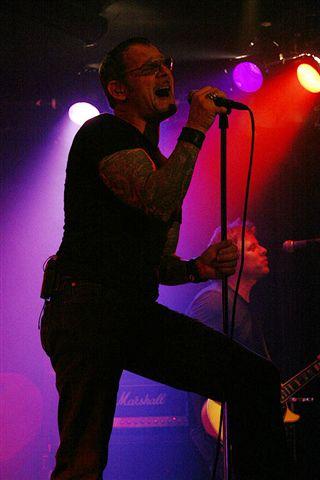
Ron at the Key Club in 2007
Looking back at the eighties there are a handful of albums that I loved that have really stood the test of time. Little Caesar’s Geffen debut is one of them. It’s a record that dares to buck the trends of the day; and while it rocks along with the best of them it’s the blues and soul at its core that make it so timeless.
The story of the band and what happened to them at the hands of their label is largely a tragedy. In a time where image was everything Little Caesar looked like they might have sounded more like Motorhead, with their tattoos and denims. For anyone who listened to the music they sounded like they belonged to another time when the song was more important than anything else and emotion and integrity came first and ‘the party’ and the trappings of rock stardom were secondary. The second album was almost as good but by then the line-up had changed and their label did their best to bury the band they couldn’t put into a nice little pigeon-hole. Then of course came grunge.
Then last year came a new album aptly titled ‘Redemption’. It was one of my favourite releases of the year and an album that shone like the first. An album like that deserves to be heard.
Mark: Thanks for taking the time to speak to us Ron.
Ron: Thank you for calling.
Mark: The new album is wonderful I have to congratulate you on that and I understand it’s just been released in Europe. How did that deal come about?
Ron: Well thank you. You know most bands have a reason to make a record for us it was more like: ‘Let’s make a record and see what happens?’ We wanted to bypass the whole business of shopping demos around looking for a deal so decided we didn’t want to do any of that; we’d just go out and record it, and figure out what to do afterwards! And being impatient we just threw it up on I-tunes because we have the technology to do that these days. Then Derek Oliver over at Rock Candy heard it and really liked it and asked us if we were interested in releasing it with his label in the UK and a few other territories. So we pulled it off I-tunes over there, got the artwork done and the response has been great so far.
Mark: Derek does a great job over there.
Ron: Yeah we spoke to a few labels and I understand how hard it is these days to be a record distributor, it’s not the best field to be in these days! You know with downloads and people stealing stuff, or giving it away for free, it’s really hard to make a business of it these days We spoke to a bunch of people who were just being unreasonable and Derek wasn’t. He’s a really smart guy, really passionate about music; he has integrity and when you add all those things together we told him we’d love to work with him.
Mark: It is the hardest thing these days for labels and artists. How do you convince people not to steal music? I’ve spoken to a lot of people recently who are just horrified by the situation they find themselves in. Where they still want to make music but feel that they can’t or they can’t do it the way they want to because of the situation they find themselves in and the lack of support out there and the fact that the industry has gone down the pan. Especially for the kind of music we love…
Ron: Definitely. It’s a very weird time out there at the moment. Technology has gotten to the point where it’s eliminated integral parts of the machinery. And the in the long run the music suffers. Sure you can get more music out there but the support no longer exists as it did. You know it takes a certain amount of money to record and make a product and get it out there. But the way the industry is has shifted the emphasis onto touring and merchandise to make that revenue. Generate enough to make the ball rolling,. Then there are other economic factors that affect a band in our position – there just aren’t enough punters coming out to the shows to make it economically feasible. So in the end it’s just a really hard job just to get it out there. You just have to hope it goes viral for some odd reason to grab the attention, whether you have to go out and murder someone (laughs) or have little dancing chickens to make it popular! It’s a weird difficult thing because there is no support.
Ron: And it’s funny looking back as it all really goes back to the nineties when it was already apparent that a label couldn’t sign a band and take the time to develop them. Because of the immediacy of success that was required to make it worth the label’s while to keep supporting the band. That was the beginning of the downfall of the industry.
Mark: I mean there were so many people employed in that whole process and all of that has gone now. Even the support industries. I spoke to a photographer at ‘Rock N America’ this year who reckoned that he was maybe one of only a handful of people still employed by a magazine – everyone else is freelance.
Ron: That’s right it’s all freelance now, all we’ll pay you a fee. No one is on a retainer. I know many people who used to go to retailers and stock their shelves and now (a) there aren’t that many retailers anymore and (b) they just order their music online. Now all those people are gone, writers are freelance, photographers are, as you say, and print media is dying. As I said it’s all becoming really strange and the challenge is to come up something different. Now it’s only the touring companies who can make the revenue like the guy who owns the Warped tours which is pretty successful. The revenue is more and more generated by sponsorship and people who use music to brand a product. It’s no longer about getting good music out there to people who will just buy it. As well the place that music holds in people’s lives is completely different from when I was a kid. Its things like TV show placement and background music to video games, it’s really weird.
Mark: It is it seems to have diluted things. I can remember nothing more exciting than going out and buying an album on the day it was released and taking it home, unwrapping it and sitting there all day with the vinyl spinning and looking at the album cover and the lyrics and really immersing yourself. You’d have your friends round and it would be a real event and it’s that that has gone, none of that seems to happen now.
Ron: The effect that it had, the lifestyle, and the passion for all the trappings has been completely diluted like you say. I know when I was a kid it was all about Circus and Creem magazine and TV shows, like here in the States, it was Rock Concert and Midnight Special. You couldn’t wait for the magazine to come out to read about the exploits of the band on the road or in the studio, and then you waited for that concert and it was what my life revolved around. And now so much just passes across someone’s computer along with everything else and that’s about it.
Mark: Well let’s not get too depressed together.
Ron: Let’s have a mass suicide!!
Laughs
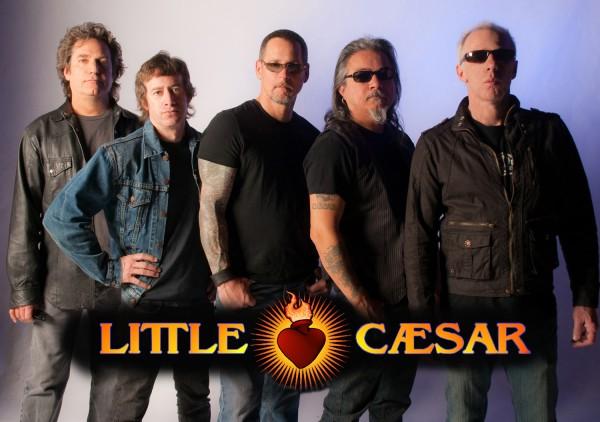
The Band today: photo by Heather Harris www.heatherharris.net
Mark: If we could just turn back to your music and the early days of Little Caesar my first experience of you guys came from the vinyl and buying that first “Name Your Poison” EP. With all those great songs like “God’s Creation”, “Taste’s Good to Me” and “Name Your Poison” all packed up in that great packaging that made it look like a condom. That EP pretty much would have led to your signing by Geffen?
Ron: Well actually it was a really contrived business move by Geffen.
Mark: I did wonder if it was a Guns ‘n’ Roses type move!
Ron: Yes coming from the home of Guns it was a very contrived move to make it look like we had street credibility. It was really strange because there was a whole lot of hoopla around the band and a lot of really powerful people were involved like Jimmy Irvine and John Kalodner and others at the label jumped on it and decided upon this great idea to go to Metal Blade and make it look like we had very humble beginnings and we should have known then that it was foretelling of things to come. But the great thing about it was that we got to work with Metal Blade and they had this whole other vibe and a real passion about music and an approach to promotion. It had to be vinyl, it didn’t matter if it wasn’t a big name producer and so we had a lot more creative freedom, and so it was great but really short-lived.
Mark: Yeah my copy here is Metal Blade, that’s what we got in the UK. And that obviously then led to the first full length which was just really different to most of the mainstream rock at the time. When you listen to songs like “In Your Arms” or “I Wish It Would Rain”; which I think is one of the few cover versions that I actually prefer to the original even though I love the Temptations. It felt like Little Caesar were out there on their own, most of the hair bands out there you felt like the ballad was almost a contractual obligation but with Little Caesar it felt like it was the heart and Soul of the whole thing. Were you aware that you were so different at the time?
Ron: You know that was the thing. I put that band together in frustration because the music that I grew up with was all blues, rhythm and blues, rockabilly, country and on top of it I had all that teenage angst and power from listening to bands like Zeppelin, AC/DC, Bad Company, Black Sabbath and so to me it all made perfect sense. So to me there was always a perfect connection between it all. And then being from Los Angeles there were all the hair metal bands that were like: cheesy rock track, ballad, cheesy rock track ballad you know what I mean? And everything that we were trying to do was so hard, everyone was telling us ‘you have to look like girls’ or ‘you have to write these goofy songs’ and I was like ‘you know I just can’t do it’. And so just the excitement around the band was intense. I just always wanted to put a heavy metal soul band together, a hard rock soul band and of course in hindsight it was kinda strange but to us we were just a rock and roll band that was doing the same thing that Rod Stewart did or Bad Company did you know: all these guys that wore their influences on their sleeves and talked about Aretha Franklin or Ray Charles or all those other great musicians that completely affected their music, the Rolling Stones even. And they just looked at us like we were strange and I just couldn’t understand it. And then unfortunately it got even further when they brought Bob Rock in and he really did a way more ‘produced’ version of the band than the band was live. And that pushed it even further and it was ‘how does a band that looks like this play songs like this’ and for us all we were trying to do was to pay homage to the music that we loved and to us it was a very obvious and conscious statement to try to get people back to listen to this music that we loved, which to us was getting completely lost in the music at that time. It wasn’t blues based anymore it wasn’t rock and roll based it was pop based: pop-based music with guitar players that overplayed. And so we really tried to do something different with that and it was looked at as weird.
Mark: I know what you mean, I remember at the time it completely passed me by. I was one of those people who picked up a record and if I really liked it I didn’t care. But I had been lucky enough to have been brought up with bands like Bad Co and the Faces: just great rock and roll bands that also looked back to the greats. You can see this whole sort of machine that kicked into gear and kind of ate itself on the end with the whole hair metal thing. I can in a way understand that the image you had may have had people a little confused, maybe you looked like a band that people assumed sounded like Motorhead, maybe you didn’t have the make-up, the teased hair, do you think you just confused the people at Geffen because you weren’t that round peg for the round hole?
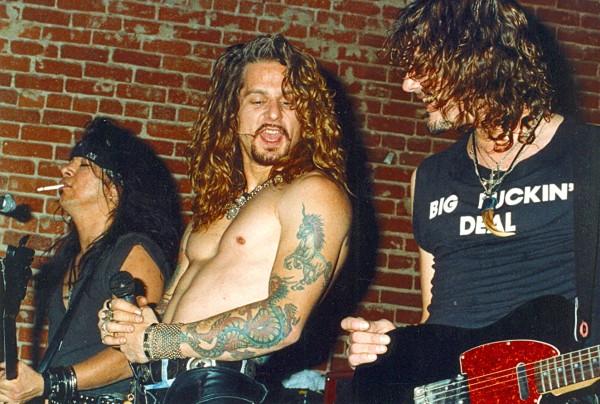
Little Caesar Live in 1990
Ron: Totally. We used to have major battles with John Kalodner and others at the label who would come to us and say ‘you need to wear nice clothes’ or ‘you need to shave off that facial hair’ because at the time no one really had facial hair! There was Zodiac Mindwarp and that was about it, and then of course when Chris Cornell and other guys from Seattle came in, you know, wearing goatees and wearing working class clothing because they were ‘making a statement’ about the music. We were a few years before that and couldn’t convince the corporate powers at the time that music had to change and that perceptions had to change and that you had to give people an alternative. Oddly enough we kind of added rebellion to the mix and said let’s look like the biggest scumbags we can as a reaction to all these bands like Poison and co coming out of town. We just wore the same clothes that we wore all day long and got onto a stage and we loaded our own gear, all to make the statement that it was the music that mattered and that we weren’t rock stars! Rockstar was a dirty word; it implied pomposity and that you were out of touch with your fans, all this stuff that just had so many negative commutations and was killing the real spirit of rock and roll. My rock stars weren’t rock stars that thought they were rockstars or that looked like rockstars. I mean at the time David Coverdale was doing almost a caricature of Robert Plant, Robert Plant was a rockstar because of who he was, he wasn’t over-effected. It wasn’t like ‘look at us with all our girls’, ‘look at us at the strip club’, ‘look at us with our Harleys’: all so clichéd. It was really getting bad.
Mark: You touch on a really good example there with Whitesnake who when I heard them they were this really great blues band, Then when MTV and hair hit Coverdale latched onto the whole scene, did it by the book and made a lot of money out of it, but it did always seem to me so very cynical. I think the thing about Little Caesar was that you had this whole untapped cross-over potential that the label just completely missed. I remember playing the album in my room and it was the first band I played that my Dad actually came in and asked who it was; he was blown away by the music. I also recall an interview you did when you touched upon a conversation you had with David Geffen and I couldn’t believe that was how things were. Could you tell us a little about that?
Ron: All the conversations we seemed to have were about money as at the time Geffen was in the process of selling the label. And we were just the band that anything that could go wrong would go wrong almost to Spinal tap like proportions. Things were destined to come off the rails. Then it was the accountants and lawyers who were taking over the labels, no longer the old school guys who were just passionate about the music and whatever their job was within it be it publicity, promotion, radio. All the corporate guys who were completely out of touch with the music, the passion and the fan side of things were running it. It just became units and sales; you could have been selling soap powder. Unfortunately you combine that with the egos fighting and all of a sudden for a band that is a little bit different, the focus gets completely diluted.
Ron: We were just sat there scratching our heads thinking is this really happening! Then it’s just ‘OK let’s crash and burn the band because the label is going to look bad’ or ‘let’s not spend any money because all that matters is the bottom line’. It’s not about development and not about believing in the music its all politics, corporate positioning, money decisions and the upshot is that all the creative energy is being killed as a result as well as the individuals that are doing it and that is kind of what happened. It’s interesting with hindsight though to look back and wonder what battles we should have stood up and fought and what we should have done to try to influence somebody. But that kind of thing happens in every relationship from personal to business! And it’s really unfortunate, you know, but there are a million bands out there that made great music that really never got their shot for whatever reason.
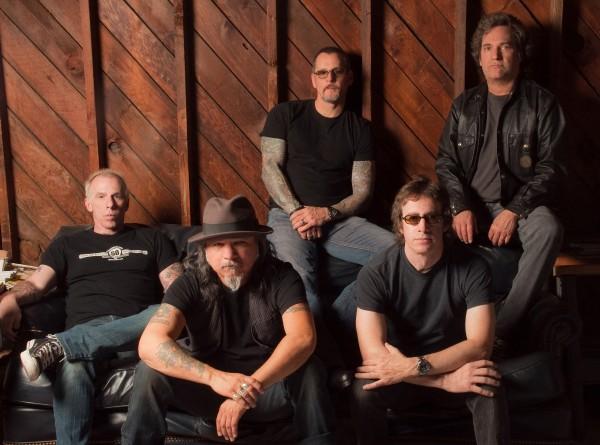
Photo by Heather Harris www.heatherharris.net
Mark: Every band out there these days has the tattooed sleeves and street clothes. You must think to an extent that maybe I was born too soon!
Laughs
Ron: It’s funny because I was born too soon and I was born too late. I feel that I’m this black guy born in a white guy’s body and I was twenty years too late. All I ever wanted to be was this rhythm and blues singer in 1968 cruising around with the Wilson Pickett’s and Otis. And old rock bands back then. Still to this day I dream that man, if only I was 18 years old in 1968 all the things I would have done, just travelled around and gone to all of these shows and listened to all this music. Being around all these bands that were just exploding and creative and making wonderful music and nobody scratched their heads! And radio would play an eight minute song and just progressive blues. It was all about tone and blues and feeling and just this magical energy that completely pervaded the music. But no one stopped to think what’s happening here as things slowly became corporate and monetarily driven. So today besides music being a lot more diluted then it was the whole business model of the corporations is dead now too and it’s really a shame.
Mark: Back in the day Little Caesar toured with a really diverse bunch of bands too, which I think just goes to show people weren’t too sure who to put you with. You played with Skynyrd, Kiss, people like Iggy Pop… Was there anyone else more unusual.
Ron: Well we did a few dates with George Thorogood, we did some dates with Bryan Adams…
We both laugh at the thought
It’s funny because all that stuff was politics. We were on the Kiss bill because Gene Simmons owed Jimmy Irvine a few favours. So we went out there and at the time Kiss wasn’t doing too well. The tour was originally Kiss, Winger and Slaughter which was a really good rock bill and they were getting good tickets sales, but then Winger had to go back into the studio as the label rejected their record as they thought it had no single, so Slaughter moved up the bill and we came on. Then the ticket sales really went down the toilet for Kiss and here was Gene Simmons coming to us and saying ‘Hey listen man what’s with the facial hair’; and ‘What’s with the songs about not making enough money’? It’s all about pussy and driving fast in the car! And we were like well we think that’s a little contrived and a little goofy. So he called up Jimmy and told him that Little Caesar was going down like pork chops at a bar mitzvah!
Laughs
And meanwhile Geffen was sending us all these reviews from the shows and people were saying that Little Caesar was the best band on the bill!
Mark: If anyone wants to check that you can even find some of those reviews on the internet today!
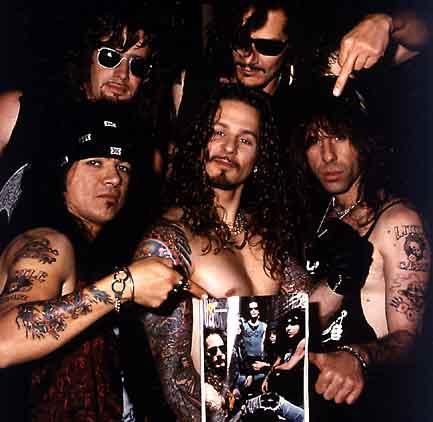
Little Caesar back in the day
Mark: When the second CD came out Geffen had more or less decided to leave you to your own devices it seems. But when you came over to the UK I had some friends who saw you there and they said it was one of the best shows they had ever seen. The press said the same and I seem to remember there was even talk of getting you on the Monsters of Rock bill?
Ron: Yeah it was funny as the guys from Thunder (who were on the bill at Monsters) were at the Marquee show. And at the time we were completely at our own devices, the band was really just hanging by a thread. Apache had left and Slick was in the band, Tom had left and Mark was in the band. We were so beat down at this point and Geffen more or less said get them out of our face, so we went to Europe. Jimmy Irvine had stopped working with us because of a big fight with Geffen over distribution at Interscope and publishing so we had to fire Jimmy even though we were friends with him. So he went and Herbie Heyward came on board. So we booked this short little run mostly because the label over there wasn’t caught up in the poison that was happening at the label over in the States and they were still enthusiastic. So we went over there and the response was great. The guys from Thunder came to us and said you must be on the bill, and even though most bands were paying like $25,000 to be on the bill they told us that they would waive that and even though they could only give us a few dollars a day at least we wouldn’t have been out of pocket. We were really excited about it and Geffen just said ‘No it’s not a good idea’. And I thought, it’s not a good idea? What playing to 50,000 people is not a good idea?
Laughs
Ron: Wow, if that is not a good idea then what is a good idea at this point! Look at the reviews of that tour the people got it, it all made sense over there. We finally have a market that finally understands. This is the home of the rebirth of Rock and Blues, this is the home of real fans, the home of diverse music. Forget MTV and stuff in the States here the fans get it, so let’s play create a buzz and then maybe come back with another record in the States and start changing some minds! And Geffen said ‘Yeah not a good idea, too much money’. And that was when we really knew it was over.
Mark: Yeah that must have clicked.
Ron: Yeah and that was when we came back and had that nice conversation with David Geffen where he said ‘you know you’re not selling enough records to pay the bills, but I’m not having you go somewhere else and become successful because it would make us look bad.’ So you know he told us: ‘You are gone, but you can’t go on as a band and make music together at least not for a good number of years’. And I thought: Oh God my dream has just turned into a nightmare!
Laughs
Mark: You know the thing is when you hear a sad story like that and all of a sudden you realise that it must have happened to who knows how many other bands.
Ron: You know it happens more often than not, especially during that period. Maybe even more nowadays? Or maybe not nowadays because they don’t even seem to take a chance these days to let a band go into the studio unless a band has 100,000 fans on Myspace and they have recorded their own music, they aren’t even going to chance the money anymore. But you know it happened so often back then. When we signed with Geffen we didn’t know that even a band like Guns ‘n’ Roses broke not because of the label’s efforts but almost despite of their efforts. They released that record like three times. Then you find that Geffen has like 280 bands on their roster and they are supporting maybe twenty-five or thirty of them. So what is happening with the other 250 bands?
Ron: Then you get bands like the Nymphs and Inger Lorre who jumped up on Tom Zutaut’s desk and literally pissed on it because they were trying to get a record made for a year and he wouldn’t release the funds to get it made because he was too busy with Guns and too busy with other bands and they were just another band who were just dying on the vine! All because of money and politics.
Mark: It’s amazing to hear how the labels worked back then from an artist who went through it all first hand. You must have some good memories from those days though?
Ron: Yeah, I mean the thing is, and this is one of the reasons we made the record Redemption, that in hindsight it is all about the journey because if you just fixate on the destination you are going to be just miserable 24/7. So just getting out there and just being in a band and all the crazy things that happen while you are playing music are the things you cherish. I mean now you just look back on all those things and laugh because it’s funny! It’s really funny. You couldn’t have written a better story.
Mark: Well that was one of the things I was going to ask you. Have you ever been tempted to put pen to paper and tell the story?
Ron: You know a few people have approached us. And VH1 had a program that wanted to do something with us, but it never came to be. So maybe one day I will sit down and put it all down, or maybe write a sit-com or something!
Laughs
Ron: But at this point we are still busy just appreciating what we have now, after all of that. We’re still a bunch of guys who love getting together and making music, and we appreciate just surviving it all. So we just kind of look it all and think of it as a blessing really because if I had become as successful as I was trying to be maybe I’d be dead by now! Maybe in the end the universe takes care of idiots way better than they can themselves!
Mark” That’s a nice way to look at it! After Little Caesar ceased to be for the first time you were also involved in another couple of projects: singing with the Four Horsemen while Frank was incapacitated in the coma and also with Manic Eden with the ex-Whitesnake guys and you put out a CD that’s really hard to get hold of now and never really got any publicity.
Ron: Yeah the Four Horsemen thing was a really unusual situation. I got a call from my friend Dave and he said that they were in this really strange position that wasn’t going to be easy for me to step into, but did I want to do the Canadian tour they had booked. So we went up to Canada but things kind of fell by the wayside when we got back. With Manic Eden I got a call from the guys who were at the time working with James Christian, but the demos weren’t really coming out like they wanted, they wanted something a little bluesier. But just as we were starting to get that together Adrian left and went back to Whitesnake so it all kind of fell apart. That was strange too: these were guys who had this heavyweight legacy: Adrian Vandenberg, Tommy Aldridge Rudy Sarzo, big names from the scene and no one would touch the record as that kind of music was dead. It was almost as if their pedigree was an anchor around their necks and they got really offended when the labels said let’s push this as Ron Young’s new project as he has more credibility! And I couldn’t believe it, are you kidding me! I have more credibility than these guys! I thought wow what is going on out there, this is so strange.
Mark: I must admit it bypassed me for years until I found it on e-bay. There are some cool songs on there but someone did a really good job of burying that one!
Ron: Well you know it came out on JVC in Japan and the Japanese guys didn’t get it as they were expecting another Whitesnake and outside Japan everyone just saw it as a bunch of heavy metal has-beens even before they listened. The record was also kind of strange as when we sat down half of it was already written. The guys were trying to evolve musically but also trying to stay close to their roots. So there was a pull in two different directions and again it just sort of fell apart.
Mark: Coming back to today I’ve read every now and again that you’ve played a few shows here and there. You played the Strip, the odd show and things like Rock the Bayou. Now that the new record is out in Europe are there plans to ramp this thing up?
Ron: We are trying to, we really are but like I said the economic situation is pretty tough so we are kind of left with local shows. And you know we are working guys so we are trying to fit it in. You look around and you see a few bands from back then, with maybe a few original members and they are doing it still but it’s really tough. We are just praying that the record can generate enough interest so that we can just keep the ball rolling. We are trying really hard to get over to Europe and we are working on an opening slot right now. But even if we only get over for a few weeks and only get to play a few clubs if we generate enough interest that means that when we get back home we can keep writing music, keep recording music and keep doing some shows. But it’s funny as we paid for this record ourselves and we’ve already recouped; and we’ve never recouped! There has always been this huge tab! Now that we are completely stripped down and on a budget we want to get to the level where we can do more than one off shows and not fall back into thinking ‘you know this really takes a lot of effort’. We are having so much fun though, and live the band has never sounded better and I don’t know if that comes from maturity, or the fact that we can just concentrate on the music without thinking about all these other things like ‘is there a reviewer there’ or ‘are we cool enough’ ‘do we jump around enough’! All that!
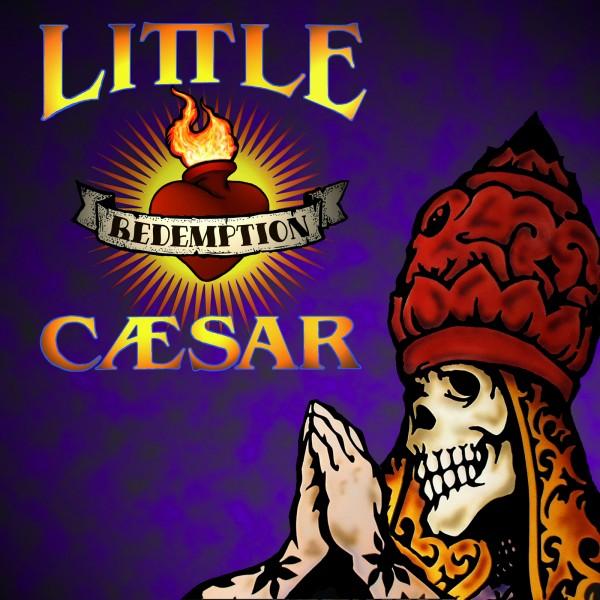
The artwork for 'Redemption'
Mark: I must admit that the new album sounds amazing and it really deserves to be heard. It’s one of those come-back albums that has more than just a glimpse of what was great about Little Caesar before. It is an incredibly consistently album too and made my Top 5 releases of last year. Songs like “Same Old Story” “Redemption” or my favourite “Witness Stand” not only capture the sound of the early days, they even exceed it and it’s not often a band that has been away for so long can do that.
Ron: Well thank you for those kind words, I really appreciate it. You know this is the really upside of being misunderstood in the early 90’s. When you are just a basic rock and roll band that stays true to its roots you can remain just a rock and roll band. If we had been a band that was trying to transition from being this bombastic pop-rock band from the early 90’s then it would be incredibly difficult. But because we always stayed true to the music we loved and weren’t just a band that captured a moment in time of musical history and the music we loved still has credibility today… I mean we are just as dated today as we were in 1990!
Laughs
Ron: and that’s kind of a good thing! We can stay true to our roots and make a record that seems a logical evolution.
Mark: I love that quote!
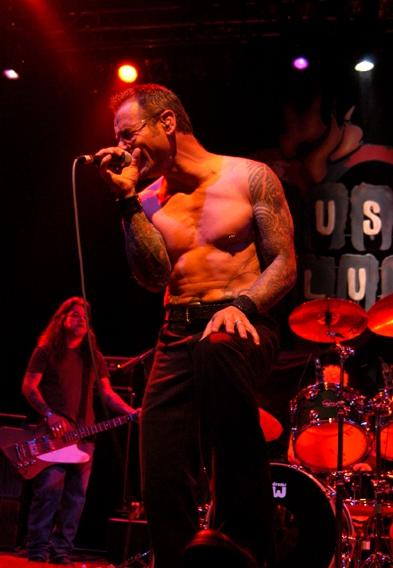
Little Caesar live today
Mark: It is really interesting today to look at some of those hair band musicians from that time and see what they are playing now. Some of the guys are playing what I would consider a more honest type of music that they obviously love but back in the day they were caught up in the whole hair band scene, whether pushed into it by labels or just going that way because of a desire to be famous. Now they are playing some pretty diverse stuff and lot of it comes back to the basics and the blues. And they seem a lot happier.
Ron: I know so many. I just caught up with my buddy who plays keys with Cinderella and I had a long chat with Tom Keefer who is a really great guy and really knows his music. Well Cinderella may not be exactly my kind of band, but I love it when Tom sings in that more natural bluesier voice. There are so many guys from back then who all live in Nashville now and they are all making country music, it’s bizarre. But the guys from back in the day who could really play, and there were plenty who couldn’t, they were just able to make a record that sounded good enough to sell records. But the real players all have their roots in things like country and the blues and as you say make that more honest type of music, and I think they are a lot happier for it.
Mark: Funny you mention Nashville I was speaking to Gunnar Nelson a while back.
Ron: Yeah my friend John plays with them; they do that tribute to their Dad that is cool.
Mark: Well he is writing a book called “What happened to my Hair”.
Ron: That’s a great title and I think it really captures it all!
Mark: I think so and on so many levels. It’s all about the fall of hair metal and the rise of grunge. Hair metal was such a stupid tag anyway!
Ron: I know and if you look on the internet we are tagged with that too! There’s a satellite radio station over here and they still play us, and I’m grateful that they do, but we are on “Hair Nation”. I guess some misconceptions about us never change!
Mark: And we all have a little bit less hair anyway than in those days.
Ron: Oh yeah!
Laughs

Ron at the Key Club
Mark: tell us a little bit about your art. A few years ago I stumbled across the fact that you were out there making things from metal from sculptures to gates to big installations.
Ron: Yeah that was a kind of interesting transition. You know my whole life I was always working on custom cars and motorcycles and that was kind of how Little Caesar met through that. It’s a real passion of mine, but I’ve always worked with metal. Then a few years back I was running the production side of this nightclub over here and I just got really bummed out by it. It was killing my passion for music and my passion for people. You know living in Hollywood and being in a night club you get to see the worst of people. So I went to welding school and bought some old used gear and just started playing around with some concepts. I took a lot of ideas from all over and tried all these concepts with the material and with colours and combining things with stone. And people started to really like the stuff. It’s a niche market but cool that people get what I’m doing. So I did these installations and off the wall architectural stuff, a little off the beaten track. Working with all this heavy metal; some really over-engineered, sturdy functional stuff too. And it’s given me a good life I get to work for myself, I have my own shop and I do everything myself. It’s my little mad-scientist place where I get to all this whacky stuff!
Mark: So all that is very much still going on then for you?
Ron: Oh yes. I have three cars I’m working on right now. But I’m very inpatient!
Laughs
Ron: I love it and it also tortures me! When I finish one I want to start another, but I can’t afford it so I sell one then start another and it never ends!
Mark: Paul Rodgers + Steve Marriott + Rod Stewart = Ron Young?
Ron: Oh my God where do I send the cheque!
Laughs
Ron: If even a tenth of that was true and that is the company I was put in then I feel like an incredibly rich person! All three of those guys, I just saw Bad Company a month ago and I it was like I was fifteen again. All the passion, all the wonderment of just staring at someone making music like that; and just to be so moved by someone’s voice and the chords and the music and the songs! Man those guys all three of them are the epitome of making great music and putting an edge to it.
Mark: I know what you mean; Steve Marriott to me is my favourite musician of all time.
Ron: Oh Man, So much soul and swagger and cool all going on at one time!
Mark: I think he just has the best white soul voice of all time!
Ron: Yes
Mark: I actually got to see Paul Rodgers too a few years ago here in Australia supporting Alice Cooper and everyone in the crowd was there to see Alice but those that listened to him, the whole room went silent.
Ron: Like going to church!
Laughs
Mark: Just that voice and when he played Seagull with just the acoustic guitar it sent shivers down my spine.
Ron: It is an incredibly moving experience you know, it’s funny as I walked out I was just so grateful that that power hasn’t been lost on me. No matter how many years you make music, and no matter how cynical you might get because of what has happened to you in the industry. That I could be so moved by music made me just so grateful that I could still be a fan way before I am a performer. Because without that you just don’t have any of the energy necessary to make the music. And so it was just so great to see a guy who could just so effortlessly, with such a craft and signature move people.
Mark: And it’s great that people today who like any of those guys can still get so much out of a band like Little Caesar.
Ron: That’s what we hope for. Because I mean we are not innovators in any way, shape or form, and we don’t pretend to be, we aren’t breaking any new musical ground we are just collecting all of our influences, as fans, and with any talent that we possess trying to put out something that’s humbling to us and trying to present a bit of what has been so powerful in our lives. If people walk away from one of our shows with the sense that it’s good then that is magic to us. Because I’m just trying to feel in my own music the same thing as I feel when I listen to Paul, or Rod or Steve or any of those guys. It’s this indulgence of a love of something. And again it all boils down to soul; it’s the same thing when I listen to Ray Charles or Aretha Franklin or Little Walter. I mean these guys can play a very simple form of music but the emotion that comes off of it is far greater than that which comes from virtuosity. It’s not about being impressed like you might be by a classical musician; it’s a feeling that is so powerful to me and obviously to other music fans.
Mark: And I think that the thing that saddens me about today is that when you see shows like American Idol, or whatever, the kids that watch those shows just understand so little about music and the whole history. They may hear a song by Aretha or the Temptations and they think that the artist up on stage has created that music. Or when they hear a cover song on the radio; and there are so may covers these days; they don’t feel any connection to those original artists, like we would, who made that wonderful, beautiful music in the first place.
Ron: Exactly. But there are artists out there like The White Stripes or The Black Keys.
Mark: And that’s the hope, the flip-side I agree.
Ron: I mean they obviously understand that heritage and hopefully in listening to bands like that the kids will dig a little deeper. There was this poll I read the other day where they asked kids 15 to 18 about their reaction to certain bands and the first was Nirvana and the top response was ‘oh an oldies band’! Wow that’s an oldies band!
Laughs
Ron: I mean oldies!? Now that is depressing! That to me is still cutting edge! Real ground-breaking in its own way!
Mark: It’s too modern for me!
Ron: Yeah! Me too but I heard that and I was thinking I remember sitting in Eddie Rosenblatt the president of Geffen’s office and he said OK you are coming out on this new label there are two other bands. There’s Nirvana, Nelson and you. Now Nirvana is like a college band they might sell about 80,000 records. And Nelson is like a pop band and you are going to be the rock band. And it was funny as I listened to the Nirvana and though well I don’t think this is just going to be just an ‘Indie college band’, I think there’s a much broader thing going on that hopefully people will get as it’s honest and it’s raw; thank god for a raw band. It may be a bit too shoe-gazing and art for me but it sure beats some other stuff out there.
Mark: Nirvana was a funny band for me because when I first heard “Teen Spirit” on the radio I liked it but I immediately thought, that’s “More Than a Feeling” by Boston! Same chords!
Ron: Right! And that was the big battle we had with Geffen. It was all about that music had to change it couldn’t just be about drum sounds and reverb it had to get back to the energy. I mean you listen to a Stones record and the tambourine is off, or an AC/DC record and the guitar is a little out of tune it doesn’t matter it’s the music that the fans relate to. It’s not just about the sonics and the gloss. And we just couldn’t get anyone to listen to us. We wanted to make a raw edgy record and they were like ‘no. no. no, you have to knock off all the edges and have this certain sound to make it more contemporary’.
Mark: Yeah the whole “everything has to fit through that round hole” and then everything all of a sudden starts sounding the same and now look where we are: everything sounds the same it’s a desperate bid to replicate success without much attention to the song!
Ron: I remember the day that John Kalodner and I had a parting of the ways on the friendship level he called me into his office and he was having a listening session with Eddie Rosenblatt and a couple of the radio guys and he called me in and he played the new Blue Murder track and they are all sat there bopping their heads and I’m waiting for a hook. Waiting for a hook! Do something that makes me remember this song! And when it finished they we all there talking about the drum sounds and the reverbs and the production. And I’m like ‘there’s no hook’. It was like someone has farted in church and they looked at me like the devil and I just said ‘kids don’t buy drum sounds or guitar sounds they buy a hook, and there is no hook’.
Mark: They missed for me too.
Ron: No hook!
Laughs
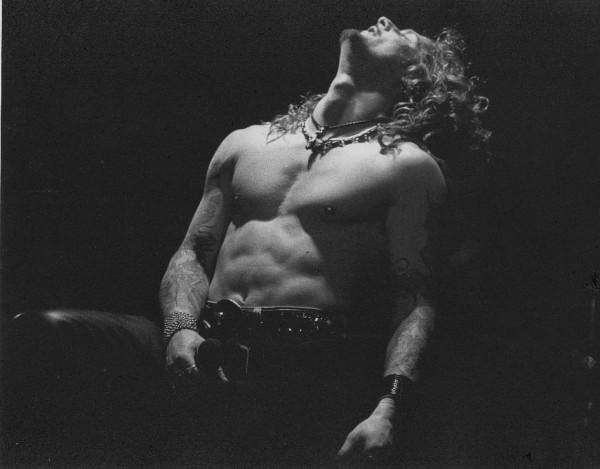
Ron back in the day
Mark: If you are OK there are just two more questions that we ask everyone. I could talk all day though.
Ron: That’s no problem I like talking to learned and passionate people who share my beliefs!
Laughs
Mark: Why thank you Ron!
Mark: The first question is if you could have been involved in the creation of one album or piece of music what would it have been and why?
Pause
Ron: This is kind of crazy but, Ray Charles’ Country record. To have been around all of those amazingly talented guys taking a very urban approach to that kind of music would have been magical and I would have liked to have been around that. And that’s really out of left-field for me too!
Mark: I think I’m going to have to dig that one out!
Ron: That guy! I mean despite being a really great singer, he had it all, the country, the rhythm and blues, the saxophone and piano. He had the gospel and the jazz and the blues and he was for me just one of those guys who couldn’t be held down and it was like he just floated around and I think in a very subtle way influenced a lot of people and showed them what could really be done with music by what he did in the fifties and sixties. Even the great rock bands I mean people like Clapton. If you can take gospel and turn it into this great R and B stuff then why can’t you take blues and turn it into great Rock and Roll? And then put it through these big amplifiers and make it really dangerous and edgy. He’s just one of those artists that is still underrated for what they did to opening people’s consciousness to what could be done with any form of music and make it into something new and exciting and contemporary.
Mark: And I do think that the appreciation for great artists like that is something that is falling by the wayside. They are the artists that influenced the guys who are influencing people today.
Ron: That was one of the things that bothered me back in the eighties when everyone was trying to be like Eddie Van Halen, and I was like ‘that was yesterday man’ why don’t you find out who made Eddie Van Halen Eddie Van Halen. Don’t just try to be him – there already is one! And then everyone was trying to be Steve Vai or Joe Satriani or Adrian Vandenberg and that was what the labels were putting out. Things that sounded like everything else and then along came the alternative thing and everyone was looking for Pearl Jams and Nirvanas. And that is what is making music dead.
Mark: It becomes a production line until the next new fad comes along and then we start replicating that.
Mark: The final question we have for you is a really easy one ‘What is the meaning of life?’
Ron: Awww, that’s a really simple question, not deep or meaningful or anything just a simple two words or so… Experiencing. One word… experiencing. The purpose of life is to experience things.
Mark: It’s all about the journey.
Ron: It is man it’s all about having a new experiences, and that involves keeping your eyes open and your mind open and your ears! And enough humility to laugh at yourself as you go about experiencing! It’s very hard to become offended or angry if you don’t take yourself very seriously.
Mark: Any other gigs you have lined up that we can tell people about?
Ron: Yeah we are playing Vince Neil’s club Feelgoods in Las Vegas on October 1st.
Mark: That’s cool it’s a great spot, I was there back in August, right down Sahara off the strip. Nice place, great people there, you’ll have a great time.
Ron: We also have a show at the Brixton (Redondo Beach) where we played with Bang Tango Redux; we’re there with Gilby Clarke on November 20th. And then we are really trying to get out to Europe so we’ll see how that pans out. If we can just put a good package together we can make it really great night.
Mark: Thanks Ron, keep in touch and let me know if you do put on a European tour. Do you have any final words to leave us with?
Ron: First of all thank you so much. These days, like I said, it’s all about trying to do the best we can and hopefully moving people when they listen. It’s not like we’re a new band trying to get a deal, or get famous it’s just that magic of playing to people who love music. We’ve committed ourselves to keeping this going now; it’s like a mission for us! So apart from it still being an incredibly rewarding experience for us to play our music we really want to get in front of more people and let them see what it’s all about. And it’s great to the see the fans and the response we get. Even from the younger people who have maybe seen more contemporary bands and just appreciate seeing a real rock and roll show: the attitude, the angst, the energy, the volume! The hair may be a little thinner, we may be a little pudgy, and we may have the lines on our face, but we still rock with the best of them!
Laughs
Mark: I’m just so happy you sound like you are still enjoying it so much.
Ron: Oh we are. The record is called Redemption for a reason. We had so much fun recording it, so much fun playing it and just so much fun being a band. We’re just a bunch of guys, we may have been to hell and back but we’ve done it together, and we’ve shared so many years. You say ‘what is the meaning of life’ and to me that is the meaning of life. It’s what you do, and who you do it with, and not being in it alone. And then having the experience of all that becomes a much greater thing because the sum of the parts ends up being so much greater than the whole. So with all that retrospective on it all it’s become much more rewarding and that is why we’re still doing it.
Mark: Ron, thank you. I really enjoyed speaking to you.
Ron: Me too.
Mark Rockpit
SEPTEMBER 2010
CATCH LITTLE CAESAR LIVE IN 2010 |
Feelgoods Bar and Grill, Las Vegas, NV October 1st 2010 |
The Brixton, Redondo Beach, CA November 20th 2010 (with Gilby Clarke) |
| Little Caesar Myspace http://www.myspace.com/littlecaesarband |